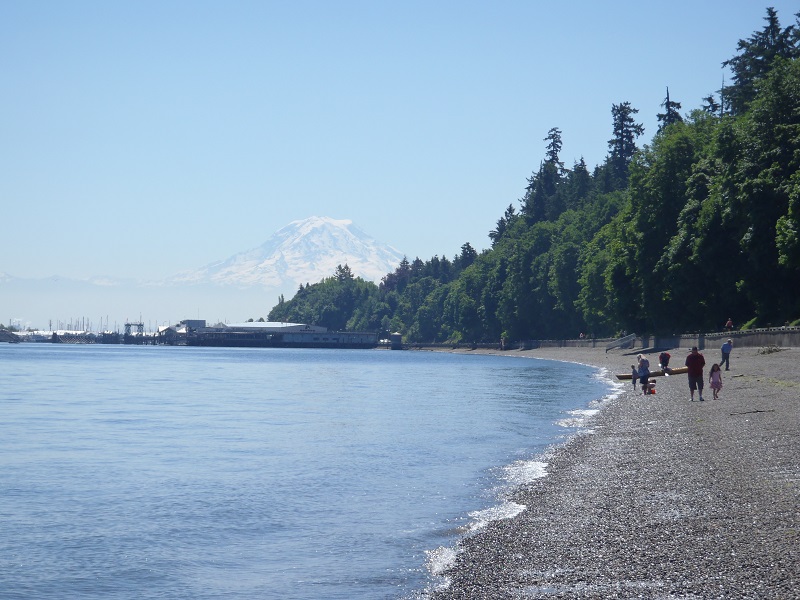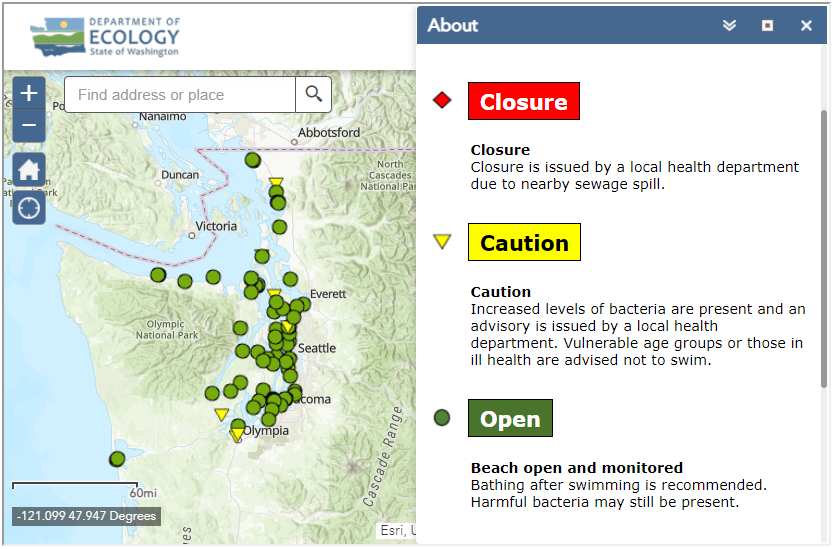
People enjoying a day at Owen Beach in Tacoma.
Warm weather is just around the corner, which means “beach time” for many, including us at the Washington State BEACH Program. You may prefer to swim in the water, kayak on top of the water, or go beachcombing next to the water — there are so many fun things to do at the beach! But before you pack your beach tote, make sure the water is clean and safe for water contact.
Swim smart – know before you go
“Each year, we begin testing the water for fecal bacteria before Memorial Day and continue weekly testing until Labor Day,” said Heather Gibbs, Ecology’s BEACH Program Coordinator. “Our goal is to make sure we are watching for possible problems on high-use saltwater beaches, so you and your family can just enjoy the day.”
Fecal bacteria comes from human and animal poop. It can cause illnesses including, vomiting, diarrhea, skin rashes, wound infections, and ear infections. One of the best ways to avoid getting ill is to check our safe swimming map before you go. Once a week, we update the status of beaches to help beachgoers plan their trip. If a beach has high levels of fecal bacteria, we work with local health districts to post advisories or closures as needed. These advisory signs will also be posted at the beach, so look for them before you play on the beach.
It takes a village
Every year, we partner with local counties, local health districts, tribal nations, and volunteer groups to monitor popular beaches throughout the state. From May to September, our partners collect samples from beaches in their area and share those results with us. Their support is vital, because it means we can test more beaches. We are thankful to all our partners and volunteers who make this work possible!
Surfrider Olympia volunteers learning how to collect water samples and environmental data.
How can you help us keep Washington beaches safe?
You can help us keep our beaches open and safe. There are easy steps we all can take to keep it fun for us and keep poop off the beach:
- Use bathrooms and swim diapers — Take frequent trips with your kids to the park’s bathrooms, and put younger kids in swim diapers.
- Scoop the poop — Pick up your dog’s poop, bag it, and throw it in the trash.
- Don’t feed the birds — Feeding the birds and other wildlife can be fun, but it encourages them to stick around, ultimately bringing more poop to the beach. Pick up your trash, and don’t feed the wildlife, no matter how cute they are!
- Don’t swim sick — Avoid swimming if you’re not feeling well, especially if you have diarrhea.
- Pack out trash — Pack your trash in a bag, and throw it away in the trash at the beach or at home.
Stay up to date on beach closures
Check our safe swimming map before you head out to the beach.
Remember to check the status of your favorite beach by visiting our safe swimming map. You can also join our email list to receive our latest Fecal Matters updates via e-mail.
We also share information about closures and advisories on Twitter, Facebook, and our website. Follow us to get the latest beach closure news.



